Slowly, you see it happening to your parents: a jar that does not open, important dates forgotten, missed appointments, the feeling of being lost at times. One day, there is a rapid escalation – a bad fall followed by a slow recovery, or an illness that never leaves. Realisation strikes: you are becoming a parent to your own parents.
Dr Sultan Ali Lakhani is the Director of Geriatric Psychiatry at Virginia Commonwealth University. He sees approximately 75–100 new cases of dementia, depression, and other mental illnesses each month among his elderly patients. Dr Lakhani, who also supports family caregivers by offering them education and counselling to connect them with resources in the community, shares some tips for caregivers:Caring for the elderly is highly revered in Islam, and its importance was frequently underlined during the commemoration of Mawlana Hazar Imam's Golden Jubilee. In the United States, November is National Family Caregivers Month – an event that pays tribute to over 16 million people in North America who provide care for a loved one. The month recognises those who spend their time and resources to care for their aging parents and other family members who are unable to take care of themselves.
Become an educated caregiver
“An educated caregiver is a better caregiver,” advises Dr Lakhani. It is important that those providing care learn as much as they can about the problems that their loved ones are facing in order to provide the best form of assistance. Confer with your loved ones' health care providers and ask them for suggested reading materials. “If your mother has Alzheimer's disease, try to learn about the process of the disease and how it will affect her memory, behaviour, and day to day functions in future,” says Dr Lakhani.
Plan for effective care
If it is not managed well, providing care can be overwhelming at times. Dr Lakhani suggests making lists of important activities. “If you are setting up a weekly pill box, do so on the same day of the week each time,” he says. Using online or desk calendars can be beneficial.
Look after your own wellbeing
Maintaining the physical, mental, and emotional wellbeing of the person providing care is essential for effective and quality care giving. Studies indicate that healthy caregivers have a better outlook on life. Pursuing hobbies of interest can make those providing care feel energised and refreshed even if it pulls them away from their duties for a short time. It is also important for caregivers not to postpone their own medical checkups. Above all Dr Lakhani advises steering clear of feeling guilty when things go wrong: “Be gentle and forgiving to yourself if you make a mistake in providing care.”
Cultivate a sense of humour
Laughter is the best medicine. Dr Lakhani urges his patients to find humour in everyday life. “Caregiving is hard work. Allow yourself time to laugh when the road ahead looks bleak,” he advises.
Actively seek support
The US Administration on Aging suggests that caregivers should ask for support if they feel overwhelmed. Develop a support system for yourself by inviting family and close friends to share the load. Actively solicit support even if it means having someone sit in for a few hours. “Also take advantage of community resources that are available out there,” says Dr Lakhani.
Additional resources and further reading
Here is a list of selected resources that inform and assist family caregivers:
- Eldercare at Home
A comprehensive online guide for Family Caregivers produced by the American Geriatrics Society Foundation for Health in Aging to provide support and guidance to families caring for an older person at home.
www.healthinaging.org/public_education/eldercare/ - Family Caregiver Alliance
The site contains a wide range of publications and services based on caregiver needs.
www.caregiver.org - National Alliance for Caregiving
The site contains a comprehensive selection of resources for caregivers, including the Family Care Resource Connection.
www.caregiving.org - National Family Caregivers Association
The site offers a virtual library of information and educational materials for family caregivers.
www.thefamilycaregiver.org/caregiving_resources - Administration on Aging
Administration on Aging helps elderly individuals maintain their dignity and independence in their homes and communities.
www.aging.com - Eldercare Locator
The Eldercare Locator is a virtual tool to help older persons and their families access home and community-based services like transportation, meals, home care, and caregiver support services.
www.eldercare.gov - Family Caregiving 101
This website provides caregivers with the basic tools, skills, and information to protect their own physical and mental health while they provide high quality care for their loved one.
www.familycaregiving101.org - Canadian Caregiver Coalition
The Canadian Caregiver Coalition promotes the voice, needs and interests of family caregivers with all levels of government.
www.ccc-ccan.ca








